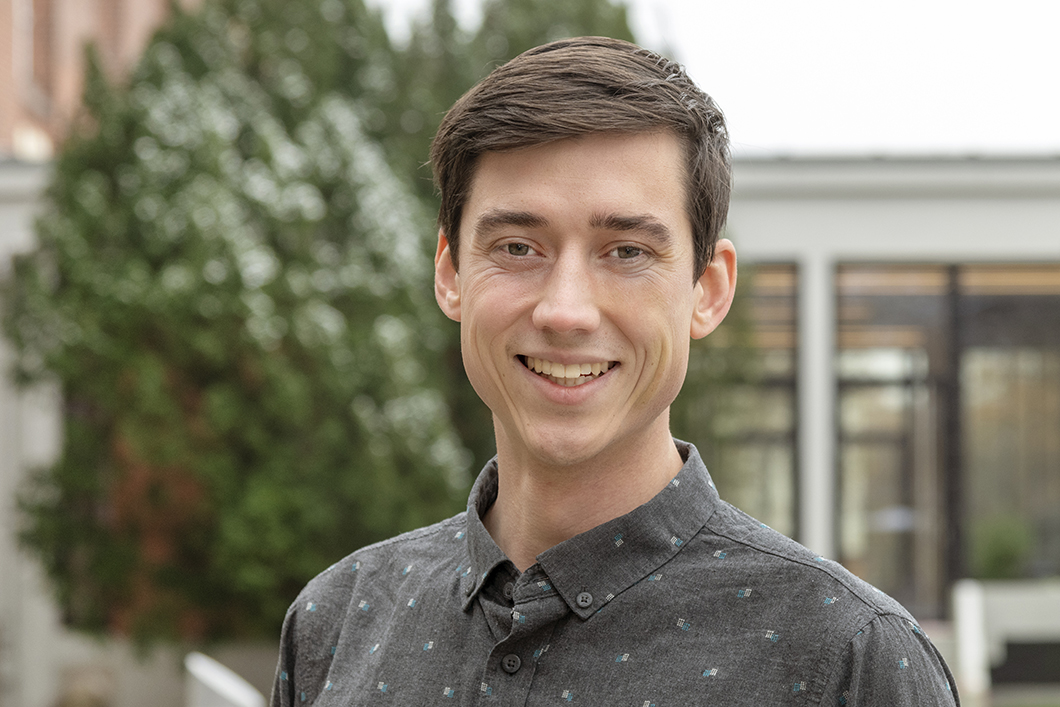
Patrick Cunningham, Technology of Construction Materials division
Source: BAM
Interview series "Introducing People@BAM"
Patrick Cunningham, Technology of Construction Materials Division
Patrick, tell us a little bit about yourself. Why did you choose to pursue a PhD at BAM?
I never set out to get a Ph.D., but since starting my university education I have been fascinated by the impact of concrete (as a material) on society. One of the greatest negative impacts of concrete is that it accounts for ~10% of human-caused greenhouse gas emissions. As such understanding the impacts of concrete and cement – and pursuing a Ph.D. – was a logical step as I strive to deepen my knowledge of concretes and the environment while I build by skillset as an engineer and scientist.
I am a Ph.D. candidate at the University of California, Davis, and a 2022 Fulbright Grantee to Germany*. I came to BAM, because I was interested in the high-level research done by my BAM supervisor (Dr. Wolfram Schmidt) and how he collaborates with stakeholders to implement his scientific findings in real world systems. This combination of stake-holder engagement, high-quality research, multi-country collaboration, and real-world implementation is what I find so fascinating about working at BAM and it really has not disappointed.
What does your research focus on, and what excites you most about this topic?
My research centers on how to produce more sustainable concretes, the second most used material by humans (after water). Concrete and cement are responsible for approximately 10% of human caused greenhouse gas emissions, which cause climate change. Climate change is the challenge of our time, we already see the impacts of more extreme weather events and less stability in our daily lives. We know these impacts will worsen and we must do more now to avoid the worst-case scenario. While the situation is extreme, the opportunity to be on the forefront of positive change, to contribute to a better world and environment, is what excites me the most. The idea that even small changes, which I may have a part in, can have large and real-world impacts really motivates me in my research and professional goals. Governments must do more, now, and I am motivated to contribute to this.
My work at BAM, specifically, looks at biobased additives for concrete. It is also engaging because it intersects multiple aspects of sustainability. We know climate change already disproportionally affect less-advantaged communities (with fewer resources). The biobased additives I investigate are regionally available in many of these communities, can help diversify supplies away from fossil fuel derived materials, and can be a key ingredient to more sustainable concretes. The potential multi-factor impact including mitigating climate change and contributing to environmental justice, for a more equitable society, is an exciting opportunity.
What do you like most about your PhD experience and how is BAM unique to other institutes?
I have the freedom to explore exciting topics and new ideas while having access to expert scientific support and great research facilities. The collaborative and international nature of BAM is important to this. My peers at BAM come from all over the world and bring both their expertise and their unique viewpoints. My work is about solutions to global challenges and, thus, this multi-cultural perspective is invaluable and pushes me to consider my work in new ways with different viewpoints.
BAM is unique compared to my university in the US in that staff and faculty are focused on research, real world application, and scientific communication to the public. In US universities a significant amount of faculty time is teaching courses to enrolled students. This means that, at BAM, researchers have more time to think about research and teaching becomes a much more informal, but also hyper-focused affair. Both systems have their own benefits, but it is a valuable opportunity, in and of itself, to see how different institutions function.
What do you like to do when you’re not doing research?
I enjoy reading (spy novels, fictional murder mysteries, and newspapers), playing music (when I can get ahold of a guitar), and playing water polo (wasserball). Activities where I can engage a different part of my mind and am immersed in the activity are important for me to reset and relax.
If you should describe your job at BAM in one word – what would that be?
Adventurer
*Patrick is a 2022-23 Fulbright Student Grantee to Germany. His views are his own and do not represent the views of the Fulbright Program.


